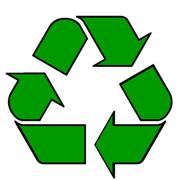
1. Reduce
When you avoid making garbage in the first place, you don't have to worry about disposing of waste or recycling it later. Changing your habits is the key — think about ways you can reduce your waste when you shop, work and play. There's a ton of ways for you to reduce waste, save yourself some time and money, and be good to the Earth at the same time.
2. Recycling
Recycling on the Flathead Indian Reservation has steadily increased over the past decades with more and more people, business, government agencies, or municipalities looking for ways to “Go Green.” The Confederated Salish and Kootenai Tribes Natural Resources Department currently recycles numerous items, depositing the recyclables at the Lake County Transfer Station to reduce the solid waste stream produced by our department.
Recycling involves processing used materials into new products to prevent waste of potentially useful materials, reduce the consumption of fresh raw materials, reduce energy usage, reduce air pollution (from incineration) and water pollution (from land filling) by reducing the need for "conventional" waste disposal, and lower greenhouse gas emissions as compared to virgin production. Recycling is a key component of modern waste management and is the third component of the "Reduce, Reuse, Recycle" waste hierarchy.
Recyclable materials include many kinds of glass, paper, metal, plastic, textiles, and electronics. Although similar in effect, the composting or other reuse of biodegradable waste – such as food or garden waste – is not typically considered recycling. Materials to be recycled are either brought to a collection center or picked up from the curbside, then sorted, cleaned, and reprocessed into new materials bound for manufacturing.
Lake County Transfer Station currently accepts the following items for recycling. The Transfer Station is located due west of the Jolly Pack Rat on North Reservoir Road right off of US Highway 93 south of Pablo, MT.
Hours are 7 a.m. to 5 p.m. Monday – Sunday, closed legal holidays. The phone number is 883-7323.
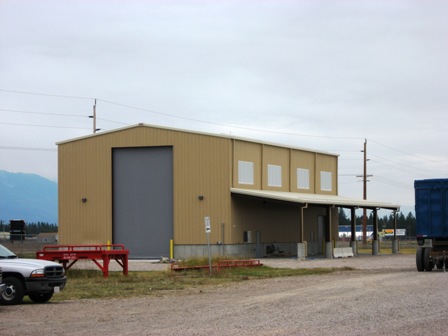
Corrugated Boxes (Cardboard):
Corrugated boxes and kraft paper (grocery bags). Flatten the boxes and do not include plastics or Styrofoam, wet, or food contaminated boxes.
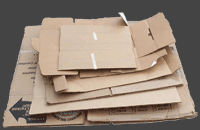
Do not include: Wax Coated Cardboard, Feed/Seed Sacks, Food Encrusted Material, Beverage Boxes (coated), Soda Pop Carriers (coated), Chipboard (Cereal & Tissue Boxes)
Newspaper:
Newspaper or advertising supplements that come with the newspapers can stay with the newspapers. Newspapers should be loose.
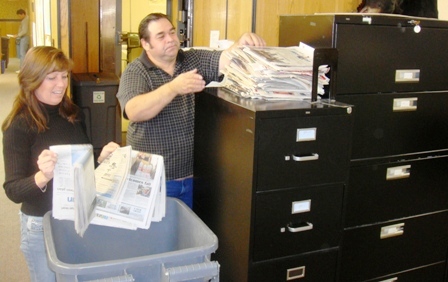
Do not include: Magazines/Catalogs, Phone Books, Unwanted Residential Mail, Junk Mail, Envelopes/Books, and Cereal Boxes.
OTHER RECYCLE ITEMS
- Magazines: Only slick or glossy magazines and catalogs accepted. Any shiny magazine like time, Newsweek, Sports Illustrated, and National Geographic as examples.
- Aluminum Cans: Cans should be rinsed and crushed if possible.
- White Office Paper: Do not include: Junk Mail, or colored paper.
- Ferrous & Nonferrous Metals Propane Tanks
- Used Motor Oil ~ Antifreeze
- Lead-acid Batteries
Plastic (#1 PET & #2 HDPE)
Bottles should be rinsed, especially milk or sweet drink type bottles.
Plastic Bottles. Examples are:
- soft drinks, milk jugs and laundry detergents.
- Narrow necked bottles
NOTE: Remove and discard all lids.
- #1 and #2 in the recycling symbol on the container bottom or side as shown below:
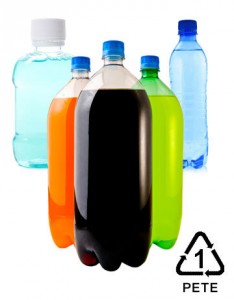
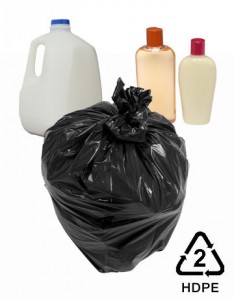
What Do Recycling Symbols on Plastics Mean?
Sometimes it seems like modern America is one colossal plastic palace. The versatile material is in our cars, toys, packaging, clothing, home goods, food utensils, medical devices and so much more. It is also littering our streets, clogging our waterways and choking marine life. Many plastics can be readily recycled, but how do consumers make sense of all the different types and rules?
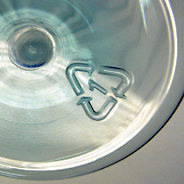
Number 1 Plastics
- PET or PETE (polyethylene terephthalate)
- Found In: Soft drink, water and beer bottles; mouthwash bottles; peanut butter containers; salad dressing and vegetable oil containers; ovenable food trays.
- Recycling: Lake County Transfer Station, only those with necks.
- Recycled Into: Polar fleece, fiber, tote bags, furniture, carpet, paneling, straps, (occasionally) new containers
PET plastic is the most common for single-use bottled beverages, because it is inexpensive, lightweight and easy to recycle. It poses low risk of leaching breakdown products. Recycling rates remain relatively low (around 20%), though the material is in high demand by re-manufacturers.
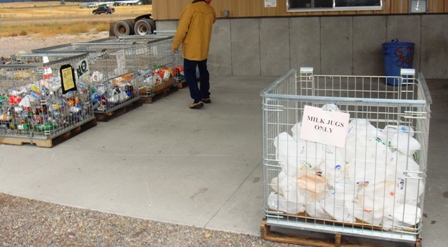
Number 2 Plastics
- HDPE (high density polyethylene)
- Found In: Milk jugs, juice bottles; bleach, detergent and household cleaner bottles; shampoo bottles; some trash and shopping bags; motor oil bottles; butter and yogurt tubs; cereal box liners
- Recycling: Lake County Transfer Station, only allow those containers with necks.
- Recycled Into: Laundry detergent bottles, oil bottles, pens, recycling containers, floor tile, drainage pipe, lumber, benches, doghouses, picnic tables, fencing
HDPE is a versatile plastic with many uses, especially for packaging. It carries low risk of leaching and is readily recyclable into many goods.
Why should you recycle?
When waste is recycled it preserves natural resources, reduces pollution, saves energy and saves space in landfills. Landfills cost millions of taxpayer dollars to build, therefore, increasing the life span of the landfill by recycling, saves taxpayer dollars.
Help preserve the Earth for the children of today and of the future. After all, we do not inherit the Earth from our parents; we borrow it from our children!
3. Reuse
Smart Shopping – purchasing items with pre-recycled and reduced packaging. The packaging is 100% recycled material, therefore, wasting less material and saving new raw materials. It’s a full circle. Instead of plastic grocery bags, use reusable cloth bags.
